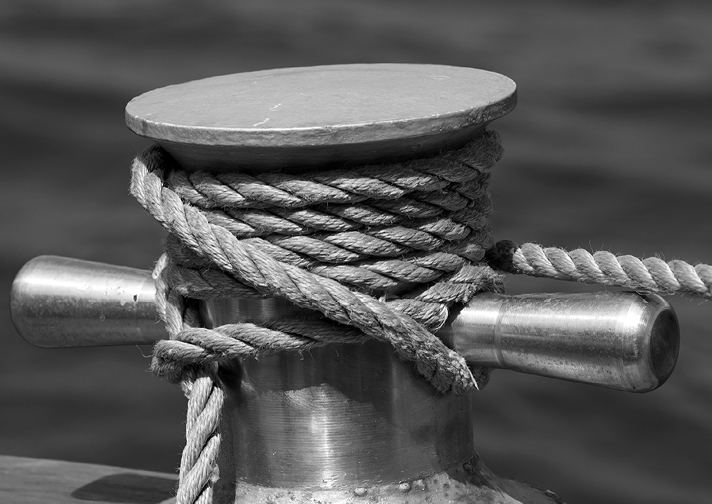
Interaction with Marina Management

Cooperation
No two marinas are alike, especially regarding management personnel and procedures. A common management hierarchy includes a dockmaster who manages day-to-day operations of the dock facilities including any support staff such as dock boys’, fuel-dock personnel, etc. Dockmasters are the key individuals to contact if you have an operational question (i.e., electric, water, etc.) or need a task performed by marina support personnel. Most importantly, they decide when the marina rules can be bent; for example, may you lease Slip A-4 even though your transom will extend six feet beyond the end of the pier? Always get on the ‘good side’ of the dockmaster because they govern the physical operations at the marina. There are myriad other ways they can make your boating life easier but more on that later.
|
AUTHOR OBSERVATION |
|
In this and other chapters that address the contract between a boat owner and a marina, the term tenant has been used synonymously with boat owner. This formality does not exist in verbal communication at marinas; in fact it’s just the opposite situation as marinas have, in recent years, recognized the importance of ‘customer focus’. Consequently, marina personnel typically address boaters as owner, member or captain with friendly respect for their customers, which they need to keep. |
Marina management personnel run the business aspects of the marina, primarily from a financial and contractual standpoint. They facilitate your marina tenant agreement, monitor your electrical usage (if necessary), assure continuous electric, water, cable service, trash removal, sewage pump-out, landscaping, etc. They also approve and oversee subcontractors rendering on-site services.
Quite often there will be an esteemed marina manager with a cadre of administrative support personnel. For small and/or efficiently run marinas, the full complement of office staff may total two to four personnel and the manager is often accessible at the front desk for informal discussion and negotiations. Sometimes the manager also doubles as the dockmaster, making final decisions on slip assignment and scheduling. On your first arrival at the marina be sure to establish a respectful, cooperative business relationship with the manager and assure him/her you’ll not be a ‘high maintenance’ tenant. Prove that you are knowledgeable about boating and marina life so you’re viewed as a potential asset to the facility.
If you are relatively new to boating and marina life, be honest and explain this to the manager and dockmaster. Ask them whether the marina community has boaters who would enjoy teaching you about various essentials of boating. Coast Guard Power Squadron members may also be an excellent source of training for new boaters.
Most marinas have a waiting list for boats needing a slip. Some marina managers will even show you a long list of names to support their claim that “It’ll be a while before we could find a slip for you in our marina. Try contacting me in six months and we’ll put you near the top of the wait list.” This fair and objective, first-come-first-served (FCFS) process is used for slip assignments in many marinas, especially those that are city-run where all decisions are purposely kept ‘black and white’; no favoritism allowed. But don’t let this fool you into thinking that slip assignment is a ‘fair’ process everywhere.
Managers at some marinas have an unwritten, subjective process that violates the FCFS waiting list concept. Case in point: many angry boat owners rightly claim they’ve been on the list at their favorite marina for years with no success and their anger grows each time they hear another boater has been assigned a slip soon after their initial inquiry. How unfair on the part of the marina manager.
Hold your judgment. Let’s first look at this situation from the manager’s standpoint. He/she has encountered hundreds, maybe thousands of boaters during their marina management career and certainly developed skills to quickly assess the knowledge, boating capabilities and cooperation of these boaters from an initial conversation or two. In many cases, prospective tenants do an excellent job demonstrating their lack of boating knowledge within the first few minutes of discussion with marina personnel.
Worse yet, the prospective tenant’s lack of patience glows brighter each time he/she calls the manager to inquire whether their slip is now available. The manager doesn’t have to be a Ph.D. Psychologist to categorize this individual as ‘high maintenance’ and likely a liability to his staff and the marina community. Accordingly, the manager mentally keeps this applicant near the bottom of his ‘real list’, never to be next in line for a slip.
“Golly, this is downright unfair.” Actually not – it’s an example of a ‘seasoned’ marina manager using their screening ability to keep potentially disruptive boaters out of their marina community. They’re doing a favor for the boating community, as well as preventing marina employees from having to receive grief from a never-content tenant.
For boaters who are disgruntled because they’re on the receiving end of this ‘blackball’ process, they should conserve their energy and obtain counseling on how to better interact with private business representatives. (In the old days they’d call this attending Charm School.) When a prospective tenant is patient, cooperative and respectful of marina management and their policies, they’ll usually obtain a slip quicker than other less-cooperative applicants. I know from personal experience at multiple marinas on both U.S. coasts.
After you’ve become a tenant, the next step is to develop a respectful working relationship with marina support staff because they are the eyes and ears of the manager. They can be very helpful with many small marina issues but on the other side of the coin, if they see or hear a tenant is breaking the rules or being difficult, word gets to the manager immediately and you may soon be questioned. As petty as it sounds, some marina tenants try to get cozy with marina management by squealing on tenants who are violating marina policies, even if the matter is relatively insignificant. You can normally spot these spies who are always looking around but not saying much.
Live-Aboard and Occupancy Considerations
Many marinas don’t allow tenants to live aboard, period. This may be their own decision or one imposed by local, state or federal regulations based upon pollution guidelines. Even though marinas prohibit discharge of treated or untreated sewage (nautically referred to as ‘black water’) into their waters, live-aboard vessels discharge considerable volumes of ‘gray water’ from sinks, dishwashers, shower sump pumps and pollutant-free bilges. Additionally they contribute lots of freshwater to the harbor during frequent hull-washing rituals. All of this liquid discharge certainly changes the chemistry of the natural receiving water in the harbor, with the effect of reducing water clarity and sometimes inducing nuisance algae blooms on account of excess nutrients being discharged. If the harbor is insufficiently flushed by tidal and/or river flows, water quality can degrade significantly with numerous live-aboard vessels fueling the problem.
Marinas situated in harbors with limited flushing are typically limited to a certain percentage of slips for live-aboard tenants, some as low as 20 percent. Consequently, if you are planning to live aboard initially or at some time in the future, it’s essential that you determine the marina’s guidelines on live-aboard slip quotas. Convey your short- and long-term plans to marina management early on, so they can give you their best guess about live-aboard slip availability.
Marinas offering live-aboard slips typically prevent these vessels from being berthed side-by-side, primarily for noise and privacy considerations, but don’t count on this. Always walk the docks and view the location of your potential slip to see if there are any undesirable live-aboard vessels close to your future home. It’s best to discuss this with marina management before you sign a tenant agreement. Also, ask them if you could move to a different slip at some time in the future if your neighbor becomes a problem. It’s best to learn early on whether management is flexible and understanding of tenants’ needs.
Even if you don’t intend to live aboard full-time, most boaters like to spend an occasional night or two aboard their vessel. Fortunately, marinas generally allow this. The limit of overnight occupancy is defined by each marina tenant agreement so read the fine-print carefully as violations can sometimes lead to eviction — not a good situation if there isn’t another marina nearby with slip availability for your vessel size.
Marinas normally allow tenants to sleep aboard for two nights each week but no more than five nights per month. They can, however, differ on temporary occupancy regulations as do the ‘watchdogs’ who report violators. At one marina there were many long-standing vessel tenants who would inform the marina manager if a neighbor had been aboard more than two consecutive nights. As mentioned above, these truly were spies hoping to gain the favor of marina management for their unsolicited surveillance services. It certainly contributed to a poor attitude in the neighborhood. From my perspective, the bigger problem was that the manager had established a type of military rule as if all tenants were under watchdog surveillance 24/7. Security from outside risks is necessary but a trustworthy neighborhood is paramount.
Wise marina management personnel encourage an active community of happy tenants and some facilities sponsor regular events such as periodic cookouts and holiday parties. These gatherings can be both enjoyable and informative as fellow boaters share local information and sources for goods and nautical services. Most certainly, there will be boaters eager to share their sea stories and live-board experiences.
Marina life can be grand if you like your neighbors but if your marina has numerous ‘derelict’ boats that are in major disrepair, the situation can be less than wonderful. Sadly, some boat owners live aboard because they cannot afford shore-side accommodations, nor can they pay for routine maintenance to keep their vessel operable and acceptable to the eye. If you see such vessels as you are making your initial walk around a new marina, ask marina management about their policy on vessel ‘operability’. At a minimum, good marinas require each tenant vessel to start their engine(s) and move the vessel out of the slip at least once annually to demonstrate operability. Tell the manager that you’ve noticed that M/V Sight for Sore Eyes is a real ‘rust bucket’ and see if they intend to force vessel upgrades or eventual eviction. If they have no concern, that will tell you ‘Captain Bligh’ will never be forced to clean up his act; good luck to his neighbors.
Other live-aboard tenants prefer to live a quiet life, free of nautical ‘small talk’ each time they walk down the dock. If that’s you, inquire whether you could lease a slip amongst the non-live-aboard boats, especially if they are much larger than your vessel. Interestingly, the largest long-term-berthed yachts in a marina are often not live-aboard vessels and are seldom used. Those over 70 feet in length, including the mega-yachts, are typically toys of the wealthy and many are used infrequently. If you don’t need daily conversation from local live-aboards, berthing amongst large non-live-aboard vessels is the quietest situation you can find. Similarly, leasing a slip amongst large For Sale yachts can offer a quiet lifestyle too. These highly expensive vessels are seldom visited by prospective buyers and only during daylight hours with the eager broker in the lead.
In summary, being a good marina tenant is all about cooperation and your attitude is essential. Conversely, if you’re a demanding tenant, you’ll find yourself being eased out quicker than you can imagine because slip assignment can be a very subjective process. Common words from the marina manager’s mouth, “Sorry but your slip is reserved by a long-standing tenant who returns each year and he’ll be arriving on Monday.”
You won’t find terms in your marina tenant agreement that give you the final word over the manager.
